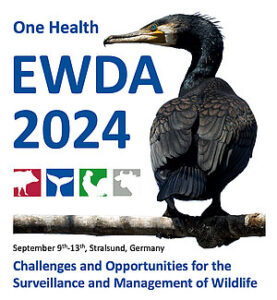The EWDA Small Grants Programme aims to promote selected activities hampered by a lack of funding, to increase the benefits of EWDA membership, to increase the visibility of the EWDA, and to provide the EWDA with a new means to accomplish the general WDA mission (“to acquire, disseminate and apply knowledge of the health and diseases of wild animals in relation to their biology, conservation, and interactions with humans and domestic animals”). Grant recipients will receive funding to accomplish a project that has defined and measurable goals that are in line with the WDA mission. Three grants are offered: (1) Wildlife Conservation Research Grant and (2) Grant for Wildlife Health Activities in Eastern Europe (3) The Amanda Hawkswood Wildlife Health and Welfare Research Grant.
Documents with the proposal guidelines and the Application Form are available for downloading below.
Wildlife Conservation Research Grant
The proposal must involve research. Methods can include laboratory or field studies, questionnaire surveys, citizen science, etc. Analysis of pre-existing samples or data is also eligible. The proposal must be directly related to wildlife health and in line with the WDA mission. Expected results must be relevant to wildlife conservation. The requested budget can cover consumables, contribute to sample collection and/or to salaries (e.g. to encourage the analysis and publication of pre-collected raw data).
Grant for Wildlife Health Activities in Eastern Europe
The following countries are considered as Eastern European countries: Poland, Czech Republic, Slovakia, Hungary, Slovenia, Croatia, Bosnia & Herzegovina, Albania, Serbia, Montenegro, Kosovo, North Macedonia, Romania, Bulgaria, Estonia, Latvia, Lithuania, Belarus, Ukraine, Moldova, European Russia, Georgia, Turkey, as well as Greece and Cyprus. These applicants should provide evidence of citizenship, and/or residency in one of these countries. Furthermore, the work needs to be conducted in one of these countries. Any kind of activity related to wildlife health and in line with the WDA mission may be eligible.
The Amanda Hawkswood Wildlife Health and Welfare Research Grant
The proposal must involve research. The proposal must be directly related to wildlife health and in line with the WDA mission. Grant applicants need to demonstrate that their research will further our understanding of and/or improve wildlife welfare. Methods can include laboratory or field studies, questionnaire surveys, citizen science, etc. Analysis of pre-existing samples or data is also eligible. The requested budget may cover consumables, contribute to sample collection and/or to salaries (e.g. to encourage the analysis and publication of pre-collected raw data).
Criteria for proposals
The main applicant and project leader must be an EWDA member. Early career members are encouraged to apply. The proposed project must have measurable objectives which are achievable within 24 months (including reporting to the EWDA board). The budget requested from EWDA cannot exceed 3,000 Euros per project. Project proposals with a higher total budget than that requested from EWDA can be considered as long the applicants provide evidence that the rest of the budget has been secured from other funding sources.
All applications should be made on the EWDA Research Grant application form.
Downloadable Documents
Past Recipients
2017
1st: Feasibility study for using aptamers for ranavirus detection (RANAPTA)
Authors and collaborators: Jolianne M. Rijks, Bernardo Saucedo, Andrea Laconi, Hélène Verheije, Andrea Gröne, The Global Ranavirus Consortium, Aptamer group
2nd: Unraveling the causes of secondary hyperparathyroidism in a colony of wild storks (Ciconia ciconia)
Authors and collaborators: Ursula Höfle, Rafael Mateo, Paula Fernandez Garcia, Begona Jimenez
3rd: Raptor health as an indicator of ecosystem health: development of novel surveillance tools for conservation
Authors and collaborators: Prof. Anna Meredith, Gabriela Peniche, Dr. Neil Anderson, Prof. Des Thompson, Dr. Mark Taggart, Prof. Richard Shore, Shaheed Karl Macgregor
2019
Wildlife Conservation Research Grant : An ecotoxicological study on the current levels of mercury (Hg) in the Danish population of otter (Lutra lutra). Miriam Dibbern -University of Copenhagen, Denmark.
Grant for Wildlife Health Activities in Eastern Europe: Are the vector-borne pathogens shared between the endangered European bisons and other ruminants? A case study from a re-introduction site in the Carpathian Mountains. Andrei Daniel Mihalca -USAMV Cluj-Napoca, Romania.


